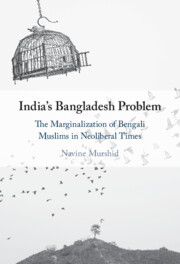Book contents
- India’s Bangladesh Problem
- India’s Bangladesh Problem
- Copyright page
- Dedication
- Contents
- Figures
- Tables
- Acknowledgments
- Introduction
- 1 Neoliberalism and Identity-Based Hierarchy
- 2 Borders as Sites of Strength and Vulnerability
- 3 Assam and the “Illegal” Other
- 4 Whatever Happened to Bengali Nationalism? The “Appeased” Muslims of West Bengal
- Conclusion
- Select Bibliography
- Appendices
- Notes
- Index
2 - Borders as Sites of Strength and Vulnerability
Published online by Cambridge University Press: 30 March 2023
- India’s Bangladesh Problem
- India’s Bangladesh Problem
- Copyright page
- Dedication
- Contents
- Figures
- Tables
- Acknowledgments
- Introduction
- 1 Neoliberalism and Identity-Based Hierarchy
- 2 Borders as Sites of Strength and Vulnerability
- 3 Assam and the “Illegal” Other
- 4 Whatever Happened to Bengali Nationalism? The “Appeased” Muslims of West Bengal
- Conclusion
- Select Bibliography
- Appendices
- Notes
- Index
Summary
Chapter 2 explains how the neoliberal logic of open borders (re)produces liminal identities in the Bangladesh–India borderlands where such neoliberal ideas confront and contend with national security and the nationalist desire for closed borders. The border participates in both fashioning a Bangladeshi Other to be strategically targeted as criminal, and its porosity helps maintain kinship ties and friendships across the border. The attention given to the border makes it clear that in contrast to the mainland, borderlands are fluid spaces with fluid identities with a more nuanced, even humane, sense of belonging and de facto citizenship. Using a qualitative approach, this chapter highlights the lived experiences of borderlanders near land ports and in the chhitmahal areas to show how people have to perform a variety of identities in order to access even the most basic necessities because of uneven neoliberal development. The changing nature of border trade and increased formalization amidst “enhancements” to support a militarized border creates a curious inversion of neoliberalism in the borderlands; although seemingly contradictory, the desire for open borders and mobility sits alongside the necessity of a closed border to gain from petty trade.
- Type
- Chapter
- Information
- India's Bangladesh ProblemThe Marginalization of Bengali Muslims in Neoliberal Times, pp. 68 - 102Publisher: Cambridge University PressPrint publication year: 2023



